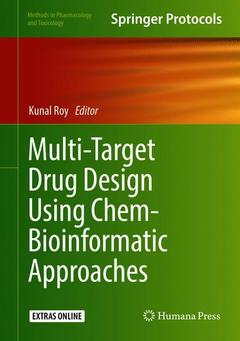Description
Multi-Target Drug Design Using Chem-Bioinformatic Approaches, 1st ed. 2019
Methods in Pharmacology and Toxicology Series
Coordinator: Roy Kunal
Language: English
Subject for Multi-Target Drug Design Using Chem-Bioinformatic Approaches:
Description
/li>Contents
/li>Biography
/li>Comment
/li>
Part I: Chem-Bioinformatic Tools
1. Cheminformatics Approaches to Study Drug Polypharmacology
J. Jesús Naveja, Fernanda I. Saldívar-González, Norberto Sánchez-Cruz, and José L. Medina-Franco
2. Computational Predictions for Multi-Target Drug Design
Neelima Gupta, Prateek Pandya, and Seema Verma
3. Computational Multi-Target Drug Design
Azizeh Abdolmaleki, Fereshteh Shiri, and Jahan Ghasemi
Part II: Computational Multi-Target Drug Design: Literature Reviews
4. Multi-Target Drug Design for Neurodegenerative Diseases
Marco Catto, Daniela Trisciuzzi, Domenico Alberga, Giuseppe Felice Mangiatordi, and Orazio Nicolotti
5. Molecular Docking Studies in Multi-Target Antitubercular Drug Discovery
Jéssika de Oliveira Viana, Marcus T. Scotti, and Luciana Scotti
6. Advanced Chemometric Modeling Approaches for the Design of Multi-Target Drugs against Neurodegenerative Diseases
Amit Kumar Halder, Ana S. Moura, and M. Natália Dias Soeiro Cordeiro
7. Computational Studies on Natural Products for the Development of Multi-Target Drugs
Veronika Temml and Daniela Schuster
8. Computational Design of Multi-Target Drugs against Alzheimer’s Disease
Sotirios Katsamakas and Dimitra Hadjipavlou-Litina
9. Design of Multi-Target Directed Ligands as a Modern Approach for the Development of Innovative Drug Candidates for Alzheimer’s Disease
Cindy Juliet Cristancho Ortiz, Matheus de Freitas Silva, Vanessa Silva Gontijo, Flávia Pereira Dias Viegas, Kris Simone Tranches Dias, and Claudio Viegas Jr.
Part III: Case Studies
10. Virtual Screening for Dual Hsp90/B-Raf Inhibitors
Andrew Anighoro, Luca Pinzi, Giulio Rastelli, and Jürgen Bajorath
11. Strategies for Multi-Target Directed Ligands: Application in Alzheimer's Disease (AD) Therapeutics
Sucharita Das and Soumalee Basu
12. ComputationalDesignof Multi-Target Kinase Inhibitors
Sinoy Sugunan and Rajanikant G.K.
13. Proteochemometrics for the Prediction of Peptide Binding to Multiple HLA Class II Proteins
Ivan Dimitrov, Ventsislav Yordanov, Darren R. Flower, and Irini Doytchinova
14. Linked Open Data: Ligand-Transporter Interaction Profiling and Beyond
Stefanie Kickinger, Eva Hellsberg, Sankalp Jain, and Gerhard F. Ecker
15. Design of Novel Dual Target Hits against Malaria and Tuberculosis Using Computational Docking
Manoj Kumar and Anuj Sharma
16. Computational Design of Multi-Target Drugs against Breast Cancer
Shubhandra Tripathi, Gaurava Srivastava, and Ashok Sharma
17. Computational Methods for Multi-Target Drug Designing against Mycobacterium tuberculosis
Gaurava Srivastava, Ashish Tiwari, and Ashok Sharma
Part IV: Databases and Web Servers
18. Development of a Web-Server for Identification of Common Lead Molecules for Multiple Protein Targets
Abhilash Jayaraj, Ruchika Bhat, Amita Pathak, Manpreet Singh, and B. Jayaram
19. Computational Method for Prediction of Targets for Breast Cancer Using siRNAs Approach
Atul Tyagi, Mukti N. Mishra, and Ashok Sharma
Part V: Special Topics
20. Historeceptomics: Integrating a Drug's Multiple Targets (Polypharmacology) with Their Expression Pattern in Human Tissues
Timothy Cardozo
21. Networking of Smart Drugs: A Chem-Bioinformatic Approach to Cancer Treatment
Kavindra Kumar Kesari, Qazi Mohammad Sajid Jamal, Mohd. Haris Siddiqui, and
Jamal Mohammad Arif
Includes in-depth explorations of a variety of multi-target drug design approaches
Provides the kind of hands-on detail that will greatly aid practicing scientists
Features key practical advice from experts in the field
These books may interest you

Computer-Aided Drug Design 147.69 €

Computer-Aided Drug Design 147.69 €


